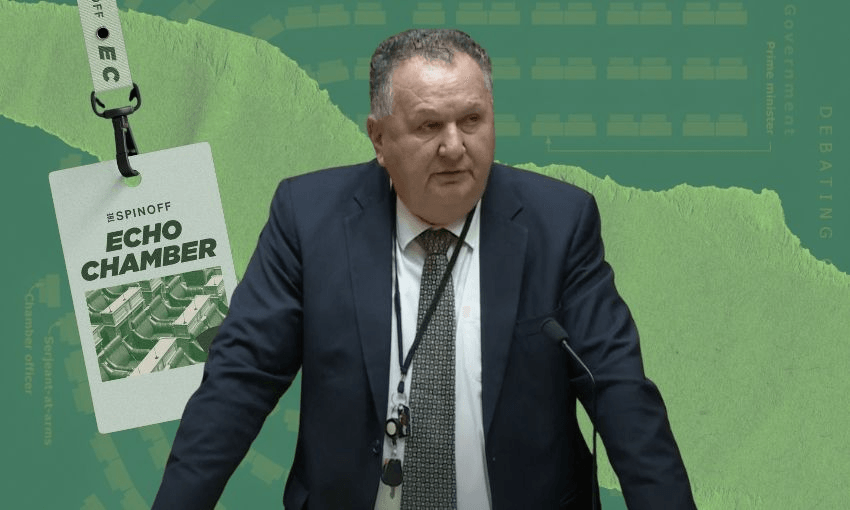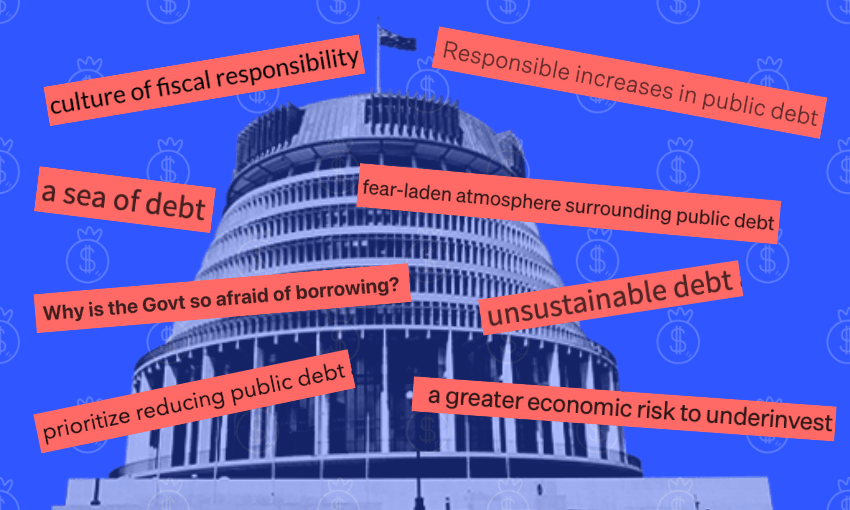Nearly 30,000 New Zealanders crossed the ditch last year. Could the minister for resources be next?
Echo Chamber is The Spinoff’s dispatch from the press gallery, recapping sessions in the House. Columns are written by politics reporter Lyric Waiwiri-Smith and Wellington editor Joel MacManus.
The last time the 54th parliament of New Zealand was gathered in the House for question time was about two weeks ago. Back then, the price of butter was the main thing on the minds of the Labour Party caucus, who appeared to see the rising cost of dairy products as a sign of the end times. On Tuesday, the new objective was to put the spotlight on the nearly 30,000 New Zealanders who left the country for Australia in 2024. So long as there remains plenty of problems to pin to the government, Labour won’t have to make the effort to dream up any of its own policies.
There have been two significant changes in the House since then as well. The death of Takutai Tarsh Kemp leaves an open seat for either Labour to bring in the next candidate on its list or for former broadcaster Oriini Kaipara to make her parliamentary debut for Te Pāti Māori, depending on who wins the Tāmaki Makaurau byelection on September 6. And, following the sudden departure of NZ First MP Tanya Unkovich, the House welcomed a new politician into its fold: David Wilson.
There was heckling from the opposition benches right off the bat when Labour leader Chris Hipkins rose to ask prime minister Christopher Luxon whether he stood by the government’s actions, which he took as an opportunity to laud vocational education minister Penny Simmonds’ recent Te Pūkenga restructure announcement, but the jeers drowned him out. When Hipkins came back with “how many Kiwis have left New Zealand since he became prime minister?”, a group of high school students sitting in the public gallery gasped “ooouusshh!”
Resources minister Shane Jones, answering a question from NZ First MP Andy Foster about economic growth in his sector, announced – “with characteristic modesty” – that he had recently travelled to Singapore and Sydney, and amazed his peers by waxing lyrical about overturning the “foolish” ban on oil and gas exploration and giving a “glowing account” of the fast-track laws, the “most permissive regime in Australasia”. The Greens co-leader Chlöe Swarbrick raised her eyebrows.
Jones’ characteristic modesty shone through again. “I have endeavoured to assure investors in the resources sector that we have decriminalised the coal industry,” the minister declared. “I had the privilege of addressing a host of mining investors [and] professionals in Sydney … They regard the quality of leadership I have shown on behalf of the government of such stature that they invited me to be a politician in Canberra.”
“Take it up!” Labour’s Duncan Webb jeered. It’s good to know that despite burgeoning opportunities overseas, our best talent stays at home.
It wasn’t over there. NZ First leader and foreign affairs minister – as he liked to remind his coalition partners before he entered the House on Tuesday – Winston Peters decided to rise and ask the minister if he was saying he’d stop “virtue signalling” by using local coal rather than “inferior” offshore coal? It gave Brownlee a moment to consider the importance of phrasing – well, he said, that question is sort of interesting, “because it’s hardly factual as soon as you say ‘virtue signalling’, but anyway”.
When health minister Simeon Brown took patsies from fellow National Party MP Carlos Cheung, it gave deputy prime minister David Seymour a chance to show off his wealth of knowledge on political theory by quoting China’s former paramount leader Deng Xiaoping: “Does the minister subscribe to the philosophy … that it doesn’t matter if the cat is black or white, so long as it catches the mice?” Brown grinned and rose to his feet, but Brownlee wouldn’t let him answer – it would only be a reasonable question, the speaker said, if the minister was some kind of expert in rodent control.
The Act Party leader sought leave for his question to be answered, but was shut down again. “Well, the House is the master of its own destiny,” Seymour said, sagely. Then Swarbrick’s voice popped up: “Get a grip!”
Back on the brain drain, Labour’s jobs and income spokesperson Ginny Andersen wanted to know whether finance minister Nicola Willis thought the government was doing enough to “deliver jobs” despite the tens of thousands headed across the Tasman. Andersen quoted Luxon and Seymour’s sentiments that Aotearoa is where the opportunities are and having people leave is “bad”, to which Seymour took offence.
Who would want a deputy prime minister who thinks New Zealanders leaving the country is a good thing, Seymour asked, then suggested that such a thing might be possible if the New Zealander doing the leaving was Ginny Andersen. His comment had Brownlee reminding the House, yet again, that question time is not an opportunity to attack the opposition. Up in the backbenches, Labour MP Shanan Halbert made his read of Seymour’s comments clear: “Misogynist!”
Maybe Seymour could’ve tried it a different way: it doesn’t matter if the cat is in New Zealand or Australia, as long as it still agrees the government is doing a good job.




